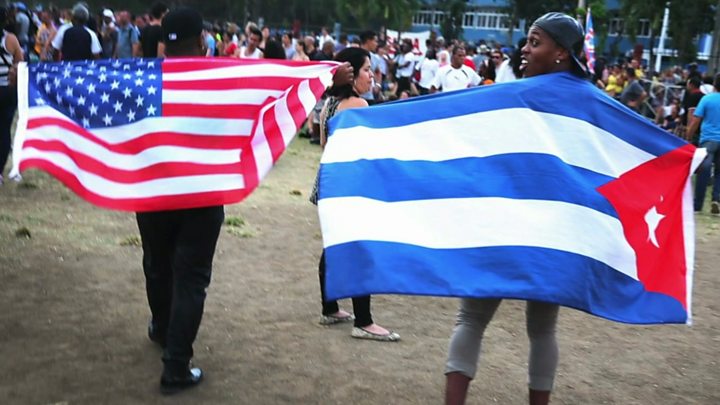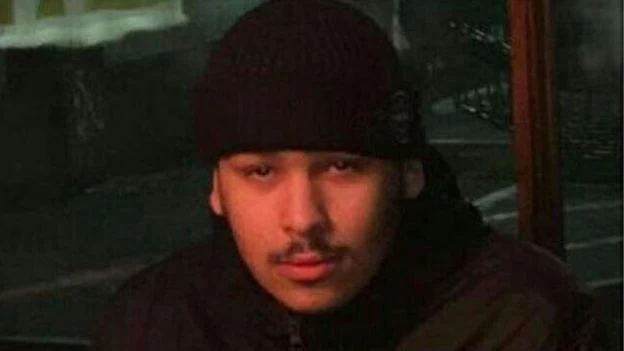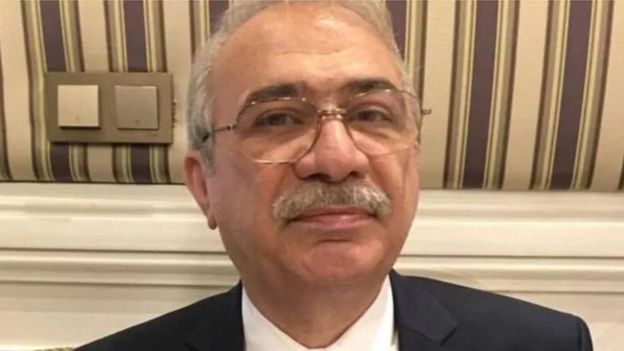US President Donald Trump says he is rolling back the Obama administration's "completely one-sided deal with Cuba".
Speaking in Miami, Florida, he said his new policy would tighten rules affecting travel and on sending funds to the Caribbean island nation.
But he is not reversing key diplomatic and commercial ties, and will not close the US embassy in Havana.
Commercial flights from the US will continue, as will allowing Americans to return home with Cuban goods.
Mr Trump said the Obama administration's March 2016 deal with the "brutal" Castro government was "terrible" and "misguided".
- Trump's promises before and after the election
- Trump's new Cuba policy: What's at stake?
- Trump accused of Cuba embargo breach
On Friday, Mr Trump signed a presidential directive calling for tighter enforcement of a longstanding ban on American tourists going to Cuba.
The new policy bans most US business transactions with the Armed Forces Business Enterprises Group, a Cuban entity involved in all sectors of the economy.
However, it exempts air and sea travel, allowing US airlines and cruise lines to continue serving the island.
Back to adversaries - Barbara Plett Usher, BBC State Department correspondent
This is a rollback, not a reversal, of Obama's Cuba policy. In the main, it is a gift to the old guard Cuban Americans in Miami who opposed the detente and voted for Trump. So it bans financial transactions with the commercial arm of Cuba's military. But it also takes into account pressure from US businesses that don't want to turn the clock back.
So it does not "disrupt" existing joint ventures and carves out other exceptions. Probably the most visible effect will be a slowdown of American visitors, who took advantage of looser travel rules that Trump says he'll now strictly enforce.
The president framed his policy in the human rights concerns of his Miami constituency, which is passionate about the regime's repression of political freedoms. But critics questioned why he singled out Cuba for such treatment when he's made a point of not lecturing other nations for bad behaviour.
They also point out that Havana doesn't respond well to such treatment: - it's made very clear it will not be pressured into making political reforms.
And it won't have taken kindly to Trump's blistering take down of the "cruel and brutal" communist regime. Whatever the practical economic consequences of this new/old policy, it seems likely to reinstate the adversarial relationship Obama sought to transform.

What has the criticism been like?
Mr Trump had faced calls from the business community not to completely reverse his Democratic predecessor's diplomatic rapprochement between the two former Cold War foes.
Myron Brilliant of the US Chamber of Commerce said: "Unfortunately, today's moves actually limit the possibility for positive change on the island and risk ceding growth opportunities to other countries that, frankly, may not share America's interest in a free and democratic Cuba that respects human rights. "
Zane Kerby of the American Society of Travel Agents said before the speech he was "disappointed" at Mr Trump's plans to "turn back the clock" in terms of expanded travel and trade between the U.S. and Cuba.
"The past few years have seen a growth in business for US travel agencies, tour operators, airlines, cruise lines, hotel and other travel companies. That progress now appears to be at great risk," he added.
Granma, the Cuban government's state-run newspaper, said the president was "stuck in a failed policy that has caused much damage to the Cuban people and has left the United States isolated".
Rolling back Obama
The Miami speech is the latest part of former President Barack Obama's legacy that Mr Trump has moved to dismantle.
He cancelled the Trans-Pacific Partnership trade deal, announced he would withdraw the US from the Paris climate accord, and is attempting to repeal and replace Obamacare, his predecessor's signature policy accomplishment.
In Friday's remarks, Mr Trump set out how his administration would seek to prevent US dollars from being used to fund what it regards as a repressive military-dominated government.
"The profits from investment and tourism flow directly to the military," he said to applause. "The regime take the money and owns the industry."
"We do not want US dollars to prop up a military monopoly that exploits and abuses the citizens of Cuba," he told the audience.
Earlier in the day, Vice-President Mike Pence visited Little Havana in Miami
What are Cubans in Miami saying?
The embargo should continue. Why give credit to a country where the people don´t see a penny? They are still starving and there is no freedom whatsoever. Why should we keep feeding the people who are on top when they repress their own people." Jose Nadal
"I am 100% Republican. I agree 150% with everything Trump says and does. They should impose more sanctions against Cuba. When Obama made the agreement and restored relations with the Cuban government, he gave them everything they asked for. We received nothing from the Cuban government. This is why Trump wants to strengthen the sanctions." Cathy Henderson
"I am against the embargo. The Cuban tyranny uses the embargo as a pretext to justify that it has failed. Everything bad that happens in Cuba, they blame the embargo." Santiago Portal
Courtesy of BBC Mundo
A history of the US trade embargo with Cuba
1959: Cuban revolutionary Fidel Castro leads a guerrilla army into Havana overthrowing the Batista regime.
1960: In response to Castro's communist reforms, US breaks off diplomatic relations with Cuba and imposes a trade embargo.
1962: Castro agrees to allow the Soviet Union to deploy nuclear missiles on the island bringing the US and the USSR to the brink of nuclear war.
April 2009: President Barack Obama lifts restrictions on family travel and the sending of remittances to Cuba.
July 2015: The US and Cuba reopen embassies in each other's capitals and restore full diplomatic ties.
March 2016: President Obama makes a three-day visit to Cuba and holds talks with President Raul Castro. He expresses hope the embargo will be ended, but it can only be lifted by the US Congress which is controlled by Republicans who oppose the move.
BBC NEWS




















